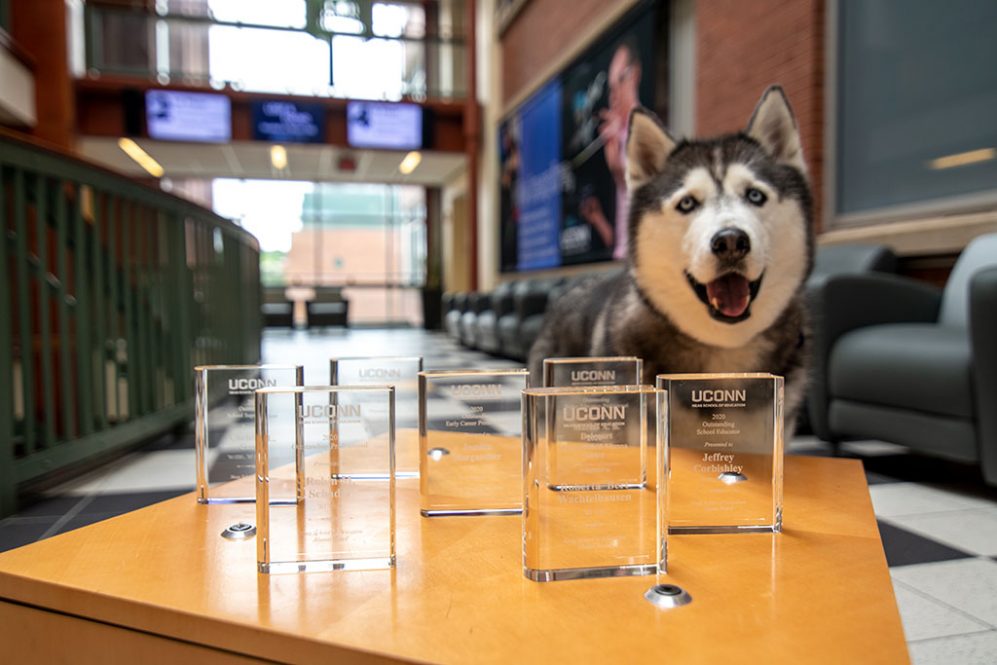By John Giardina
Alumnus Matthew DeLisa credits his UConn engineering professors with jump-starting his interest in chemical engineering and academic research. Today, as an associate professor of chemical and biomolecular engineering at Cornell University, he is focusing his attention on the development of novel therapeutic proteins. The goal of this research is to demonstrate how proteins can be rapidly and inexpensively engineered to target specific diseases such as Alzheimer’s, Parkinson’s and Huntington’s disease, and bacterial infections and cancer.
 Dr. DeLisa received his B.S. in chemical engineering in 1996 and continued his studies at the University of Maryland, where he earned both M.S. and Ph.D. degrees. A two-year post-doctoral stint at the University of Texas-Austin followed, and he began his independent career at Cornell in 2003.
Dr. DeLisa received his B.S. in chemical engineering in 1996 and continued his studies at the University of Maryland, where he earned both M.S. and Ph.D. degrees. A two-year post-doctoral stint at the University of Texas-Austin followed, and he began his independent career at Cornell in 2003.
Proteins are critical to nearly every function within a living organism; as such, each type of protein has a specific function, from structural support to hormonal and immune system activity. In his bid to develop superior therapeutic proteins, Dr. DeLisa’s research focuses on changing three key properties: binding affinity, stability, and substrate specificity. He explained that, in manipulating the binding affinity of proteins, the aim is to enhance their adhesion or “stickiness” toward natural and even unnatural targets; to better understand this, consider how antibody proteins effectively track down, bind to – and disable – germs. A stronger bond will enhance the likelihood that a therapeutic protein successfully disarms an invading virus or bacteria.
Another target of Dr. DeLisa’s research is protein stability: here, his efforts focus on modifying a protein in ways that allow it to survive under a wider range of conditions than normal without degrading. Finally, his research seeks to adapt proteins to act on non-native substrates. Enzymes are a certain type of protein which essentially perform chemical reactions. Normally, an enzyme performs the reaction on a single compound, called a substrate. However, when Dr. DeLisa engineers enzymes, he tries to make them act on substrates that they would naturally not change. This makes it easier for the proteins to change other compounds, expanding the therapeutic capabilities of the protein.
In manipulating proteins, Dr. DeLisa employs two methods. The first involves changing the amino acid sequence of the protein in question, changing the functional molecular groups which define the form and function of the protein. The second method, called “glycoengineering,” involves the attachment of specific carbohydrate molecules to sites on a protein, trying to achieve specific chemical or biological properties.
Dr. DeLisa’s research accomplishments have not gone unnoticed. He has won numerous awards, including an NSF Early Career Development (CAREER) Award, the Provost’s Award for Distinguished Research and the American Chemical Society’s Young Investigator Award for his contributions to the field of biomedical technology. He also currently leads Cornell’s Medical and Industrial Biotechnology Program, an interdisciplinary Master of Engineering program that prepares students with hands-on laboratory skills for the ever-changing field of biotechnology.
Dr. DeLisa credits two of his UConn engineering professors, Dr. Robert Weiss (who retired from UConn in 2010 to accept a position at the University of Akron) and Dr. G. Michael Howard (now professor emeritus) with triggering his interest in research. “Dr. Weiss gave me my first exposure to academic research. Working as an undergraduate researcher in his laboratory sparked my interest in research and ultimately was the inspiration I needed to apply to graduate programs in chemical engineering,” he said, adding, “Dr. Howard was special because of his willingness to spend countless hours answering my questions during and long after his office hours. He helped me to think and solve problems like a chemical engineer.”
Currently, Dr. DeLisa is on sabbatical in Zurich, Switzerland. While there, he aims to learn from leaders in the fields of immunology, microbiology and protein glycosylation. He also hopes to find some time for cycling and skiing in the Alps with his family.
Reflecting on his time at UConn, Dr. DeLisa remarked, “To this day, I am still a die-hard Husky. I continue to follow the University and all of the great things that are happening on campus.” If his recent work is any indication, the UConn community will also follow his work for some time to come.



